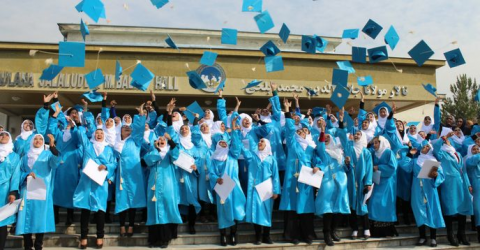
GCED Basic Search Form
Quick Search
You are here
News

UNESCO will award its Literacy Prizes on 7 September on the eve of International Literacy Day, celebrated every year on 8 September. The theme chosen for 2018 focuses on literacy and skills development.
The award ceremony of UNESCO’s International Literacy Prizes, at UNESCO Headquarters (5 to 6 pm, 7 September), will conclude the Organization’s global celebration of International Literacy Day.
Earlier in the day, an International Conference on Literacy and Skills Development will bring together stakeholders and decision-makers from all over the world to examine how integrated approaches to literacy and skills development can help close the literacy gap and improve learners’ ability to meet the needs of today’s increasingly globalized and digitized employment market.
Globally, at least 750 million people still lack basic literacy skills. Two-thirds of the people concerned are women and 102 million of them are youth aged 15 to 24. At the same time, many of the 192 million unemployed worldwide are unable to find a decent livelihood due to the lack of foundational skills, including literacy, and failing to meet the skill demands of the rapidly changing labour market.
These challenges are at the heart of this year’s International Literacy Day, which will seek to identify effective, combined approaches to literacy learning and skills development so as prepare and support life-long learning, improve lives and livelihoods.
“It is through literacy that every one of us can become the master of their destiny,” declared Director-General Audrey Azoulay. Acquiring this fundamental skill marks a first step toward freedom, liberation from social and economic constraints. Literacy is the cornerstone of individual and collective development. It helps break the vicious circles of social and gender exclusion.”
“While considerable progress has been achieved in recent decades,” she adds. “We have yet to create a world in which every individual disposes of the basic skills they need. UNESCO is committed to working on the redefinition of literacy policies to foster innovative educational practices. On this Day, I invite all the actors in education and beyond to commit themselves to bringing us closer to the achievement of full literacy.”
The International Literacy Prizes ceremony will celebrate the laureates and their programmes, examples of best practices in advancing literacy and skills development:
The three awards of the UNESCO Confucius Prize for Literacy, supported by the Government of the People’s Republic of China, rewarding work that benefits rural populations and out-of-school youth, particularly girls and women, will be given to:
-
Consolidated teaching of literacy and ICDL (International Computer Driving License) basic computer skills (Iran), a programme by the Literacy Movement Organization, which promotes literacy and computer skills for children and adults, focusing on women and girls in rural areas, minorities, factory workers, and people in detention.
-
National Open University of Nigeria - Nigerian Prisons Study centres and inmates General Education Programme (Nigeria), a programme of the Nigerian Prisons Service that seeks to change attitudes, values and behaviours through literacy, and technical and vocational trainings for inmates to facilitate their social reintegration.
-
Spanish as a second language for adult immigrants (Spain), a programme by The Foundation Elche Acoge that promotes social and workplace integration for immigrants, through Spanish classes and other activities that improve language and skills learning.
The two UNESCO King Sejong Literacy Prize awards for mother-tongue literacy education and training, sponsored by the Republic of Korea, will be given to:
-
Accelerated Education for Marginalized Women and Girls (Afghanistan), a programme created by Aid Afghanistan for Education immediately after the Afghan war to provide learning opportunities for women and girls outside of the formal school system. It gives people a second chance to complete their high school education and vocational training enabling them to find work or establish their own businesses.
-
Programa Aprender Siempre (Uruguay), a programme by the Ministry of Education and Culture of Uruguay that offers flexible citizenship education to prisoners in a framework of lifelong learning, along with literacy and technical and vocational education and training.
URL:
